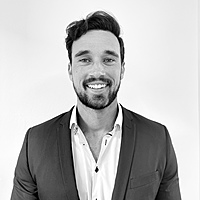An undervalued small cap growth story
In the current environment, where Aussie small caps have generally been hammered, we’re on the lookout for bargains. The types of opportunities we’re looking for can generally be classed into two groups.
The first is a special situation type set up, like this one we wrote about last week, where there’s an event that has unlocked value and the market is yet to price it correctly.
On occasion we’re finding examples of companies trading at huge discounts to net cash, and as great as these are, they’re generally one-off value creators.
The second, which is our preferred, are undervalued, well managed growth businesses exposed to multi-year secular thematics that will be present regardless of interest rates, inflation or any other macro news of the day. In an ideal world we’d be able to find enough of these to fill a whole portfolio and keep compounding them over years as we sit on our hands.
This wire focuses on our highest conviction undervalued growth story in the Inception Fund.
The Environmental Group
The Environmental Group (EGL), as its name suggests, is a company with a broad suite of environmental solutions spanning waste management, air pollution control, gas turbines and manufacturing & servicing of boilers.
Across these business units the group is exposed to an attractive collection of investment themes including transition to renewables, more stringent regulations surrounding air and water pollution, the critical minerals boom, the circular economy and the treatment of ‘the next asbestos’ in PFAS. The graphic below neatly summaries the business models and addressable markets.
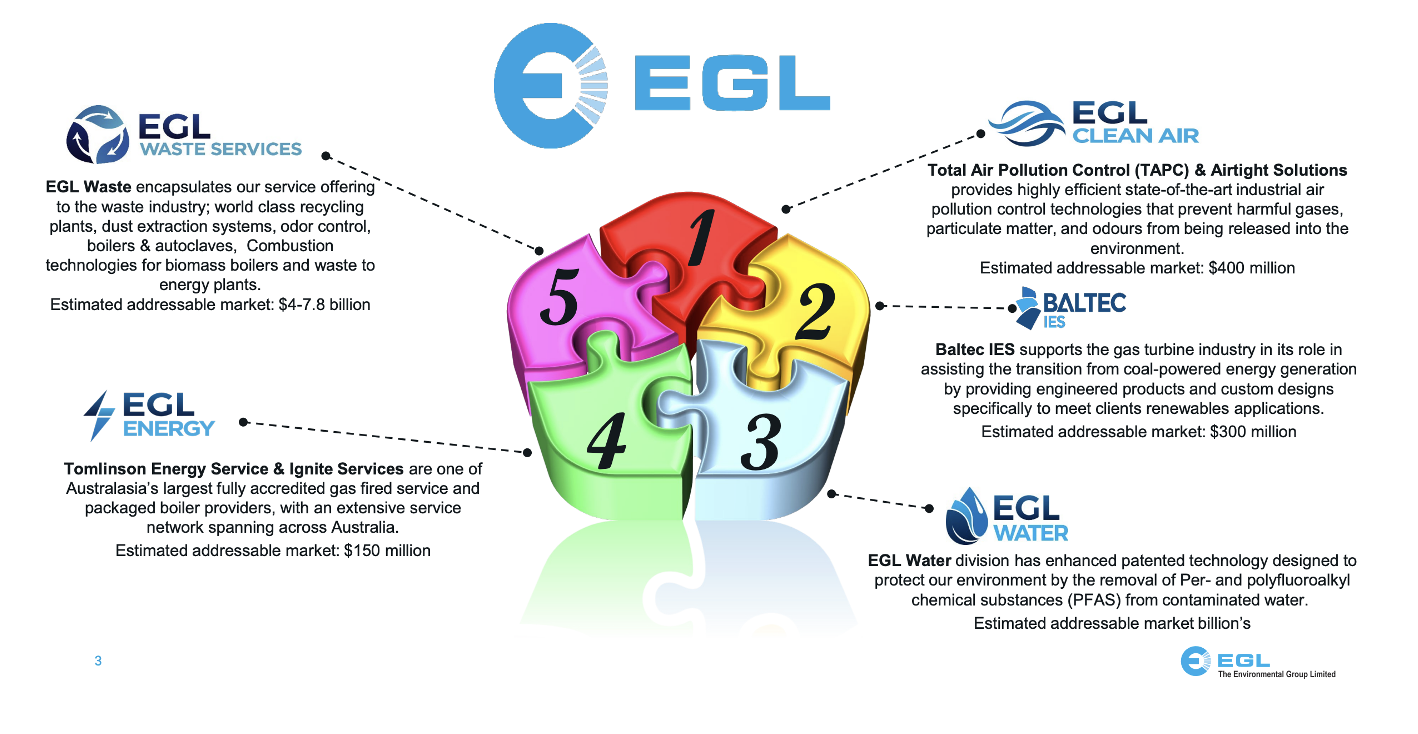
EGL has a long history, incorporated back in the 1920s and listed in the 1970s. But the story relevant to us begins when Jason Dixon was appointed CEO in early 2021.
Jason’s previous gig was at ToxFree, which was eventually sold to Cleanaway, the waste management behemoth. It’s likely that many of the fundies on the EGL register made good money at Tox and are backing Jason to do it again. One thing I’ve learnt in small caps is that the benefit of having a CEO who’s 1) done it all before and 2) is well known and liked by the investment community, is invaluable.
When Jason joined, EGL acquired his business (Active Environmental Solutions) for shares in the company. Jason now owns about 5% of EGL, ensuring alignment.
Over time he overhauled a large portion of the management team. The National Sales & Marketing Manager who joined at the same time through the AES acquisition, Paul Gaskett, owns c.3% and was previously the National Sales and Business Development manager at Cleanaway. The most recent addition was Michael Constable, the long-time Toxfree CFO, as non-executive director. Seems the band is back together.
Between the board and other key execs there’s another 3-4% ownership, with the largest shareholder being the founder of one of the businesses in the group. Then there’s well regarded institutional fundie Greencape Capital, and us – HD Capital.
I could flood this wire with details on how new management realised the potential of the company by being ruthless on sales margins, completely overhauling contract terms to ensure all new contracts are cash flow positive from day one, and implemented the ‘One EGL’ strategy to ensure the businesses are operating synergistically and cross-selling all services.
But the numbers tell the story more succinctly.

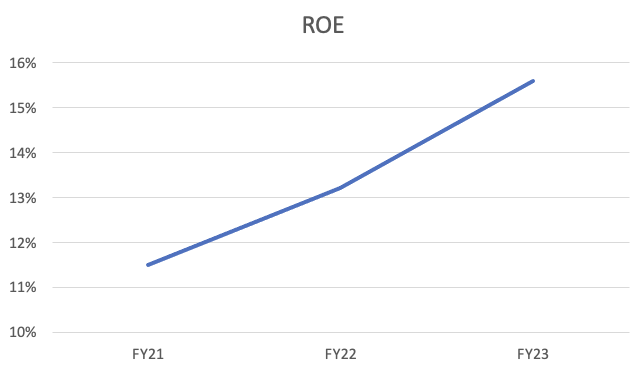
And while the management team have executed flawlessly to date, it’s also true that a lot of what they achieved wouldn’t have been possible unless the EGL group of businesses were reasonably high quality in their own right – the old Buffett quote of business quality > management skill.
These businesses always had potential and, in many ways, their ‘time has come’ in terms of the tailwinds created by recent structural market shifts – lithium CAPEX boom for EGL Clean Air, solar powered investment for Baltec and EGL Energy, recycling regulations for EGL Waste.
They possess qualities of good businesses – very few competitors (i.e. alternatives) for TAPC; intellectual property and engineering expertise of Baltec or EGL Water; niche market or regional dominance for TAPC and Baltec; high portion of recurring service, spares and maintenance work for TAPC, Tomlinson Energy and Ignite; annuity revenues that stream off EGL Waste for all business units.
And perhaps most importantly they’re all operating in rapidly growing, structurally favourable markets. Growth isn’t a fix all, but boy does it help. EGL will generate close to $9m of EBITDA this year based on current guidance, vs $3.2m in FY21.
Tailwinds and Growth Markets
If you compiled a list of all the most attractive secular growth industries over the next decade or so, it would probably look pretty similar to the list below, which outlines the tailwinds that EGL is exposed to.
Transition to Renewables
This theme is well versed, and regularly receives mention on Livewire.
Specific to EGL, if anything has changed in the last 12 months, it is the recognition that the transition is going to take a lot longer (and cost a whole lot more) than expected, and the extended role that gas will play in the interim. This has driven up the demand for gas turbines to the benefit of Baltec, which has a long history of providing solutions to the gas turbine power industry.
Gross margins have steadily grown (2H23 substantially up on 1H23) and the order book is at record levels with requests for work looking strong. We would expect Baltec to generate >50% EBIT growth in FY24.
When we first invested in EGL, Baltec was probably the least exciting business in the group. But in mid-2023 EGL announced the company had won its first contract in the solar farm industry, providing the air filtration system to a power generation client, which will now act as a reference site for further prospective clients.
They are solving a problem for which there is currently no OEM solution, opening an enormous opportunity both domestically and internationally.
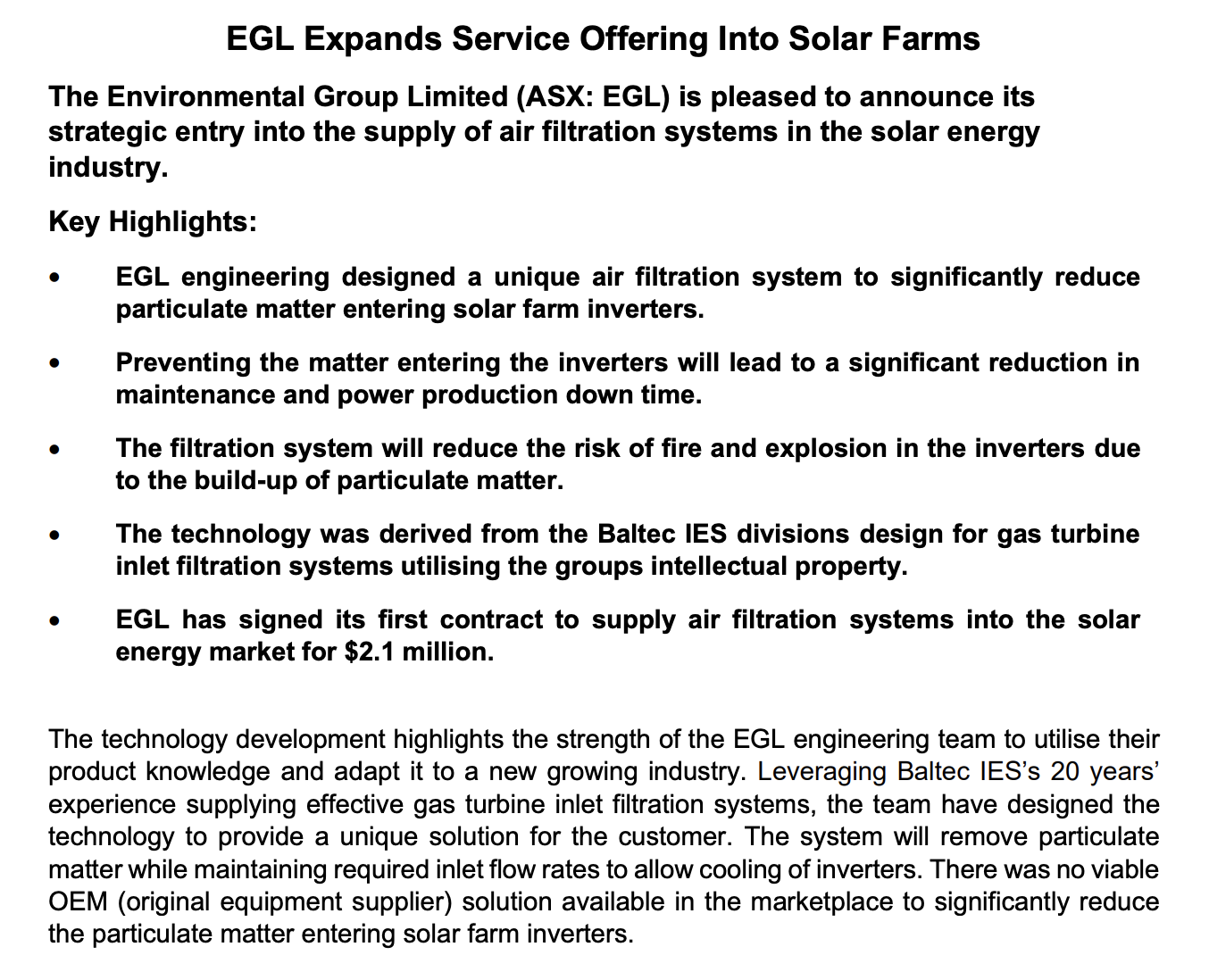
This, along with the demand for gas turbines, means Baltec is potentially an exciting growth business for years to come.
Circular Economy
It has a bit of a faddish name, but the tailwind driving EGL’s Waste division is largely driven by government regulation.
The Waste Reduction and Recycling Act will effectively ban the export of waste outside of Australia from 2028. That’s driving a CAPEX boom for the development of local recycling plants, estimated at $10b+, for the likes of Cleanaway and peers.
How does EGL benefit?
EGL Waste have an agency agreement with world leading waste plant manufacturer, Turmec. EGL receive a commission on the total value of the waste plant sold, which is high margin and capital light.
But the real value is in how EGL Waste pulls together the offerings of every other EGL division. As part of a recycling plant bid, TAPC might build the dust extraction systems, Tomlinson provide the boilers and EGL Water provide the PFAS treatment solution.
And then the group retains high value, high margin recurring servicing and parts revenue on the plant for the life of the project, which tends to be decades.
In FY23, there were delays to the awarding of large recycling plant tenders primarily because the government pushed out the deadline of waste export from 2026 to 2028. But these tenders will get awarded, and we’d expect EGL to benefit substantially.
Critical Minerals Boom
I’m sure you’ve heard the old saying of playing the mining boom by selling the shovels. That’s close to how EGL’s Clean Air division has, and will continue to, benefit from the CAPEX boom for critical minerals.
The boom in demand for lithium, nickel and rare earths, amongst other minerals, has driven increased investment across the supply chain, including in refineries. These refineries all require emission control systems to manage the environmental impact. EGL Clean Air (through the TAPC and AirTight brands) are the leading provider of these solutions in Australia.
The TAPC brand services the high value, corporate customers and has won so much work in the last two years that the recurring revenue line (spares and servicing) is now running at levels greater than the entire revenue base of the business when Jason first joined.
As more capital is invested in the critical minerals supply chain and emissions regulations become more stringent, EGL Clean Air is likely to benefit.
PFAS – The next Asbestos
I could dedicate an article to the topic of PFAS and the size of the opportunity for companies like EGL to treat and destroy it, but that’s not the primary purpose of this note. For our purposes, it’s worth understanding the health risks (read this) and the incoming government regulations that will drive the investment in fixing the issue.
When we first invested in EGL, it was their breakthrough PFAS opportunity that provided the blue sky. At that time, they had just released results of studies that proved the effectiveness of their solution, allowing the commercialisation phase to begin.
Fast forward two years and it is only now that the opportunity is becoming real, owing to the extensive regulatory hoops that needed to be jumped through.
The business model for EGL’s PFAS solution is an upfront sale of the system, followed by a volume-based royalty. They do not disclose the details of this, but we understand that a significant profit is made on the initial upfront sale, and the royalty is effectively high margin, annuity income.
We are value investors. We like boring, steady, predictable cashflows. The phrase ‘game changer’ is usually not a good one for value guys like us.
But EGL’s PFAS is a genuine game changer, if successful, and we’re getting it for free at the current valuation. There is the prospect, however risky, that the EGL Water division alone could double EGL’s overall earnings over 3-5 years, putting aside the growth in every other division. If it works as management are targeting, the stock is likely to be a multi-bagger many times over.
But again, we’re value investors. We’re here for the steady, structurally growing, cash generative businesses in EGL. PFAS is just blue sky.
If there’s a commercial breakthrough in this part of the business we’ll provide an updated wire outlining what it means. For now, think of it as optionality.
M&A Upside
One of the EGL management team’s strengths is mergers & acquisitions. At Toxfree, Jason oversaw $400m of acquisitions, so he knows how to do a deal.
To date, EGL have made two acquisitions. Ignite Energy Services (which is part of EGL Energy) and AirTight (EGL Clean Air).
Ignite was acquired in 2022 and has already proven to be a cracker deal. It was a highlight in the 2023 results and the team at Ignite have been tasked with designing EGL’s PFAS plants.
AirTight was only acquired in mid-2023, so it will take longer to form a view. But it looks like a good deal from what we’ve seen, further expanding EGL’s presence in the air pollution control market and, alongside TAPC, positioning them as the leader in Australia. TAPC has the enterprise part of the market covered, while AirTight services the mid-market.
There will be more acquisitions to come for EGL. Importantly, the strong balance sheet reported at FY23 (net cash $8.5m), a new debt facility and the cashflow of the existing business, means that future acquisitions are likely to be internally funded without an equity raise.
Summary
EGL have given guidance of “greater than 30% growth” in underlying EBITDA in FY24. Given they did $6.7m in FY23, that equates to >$8.7m this year.
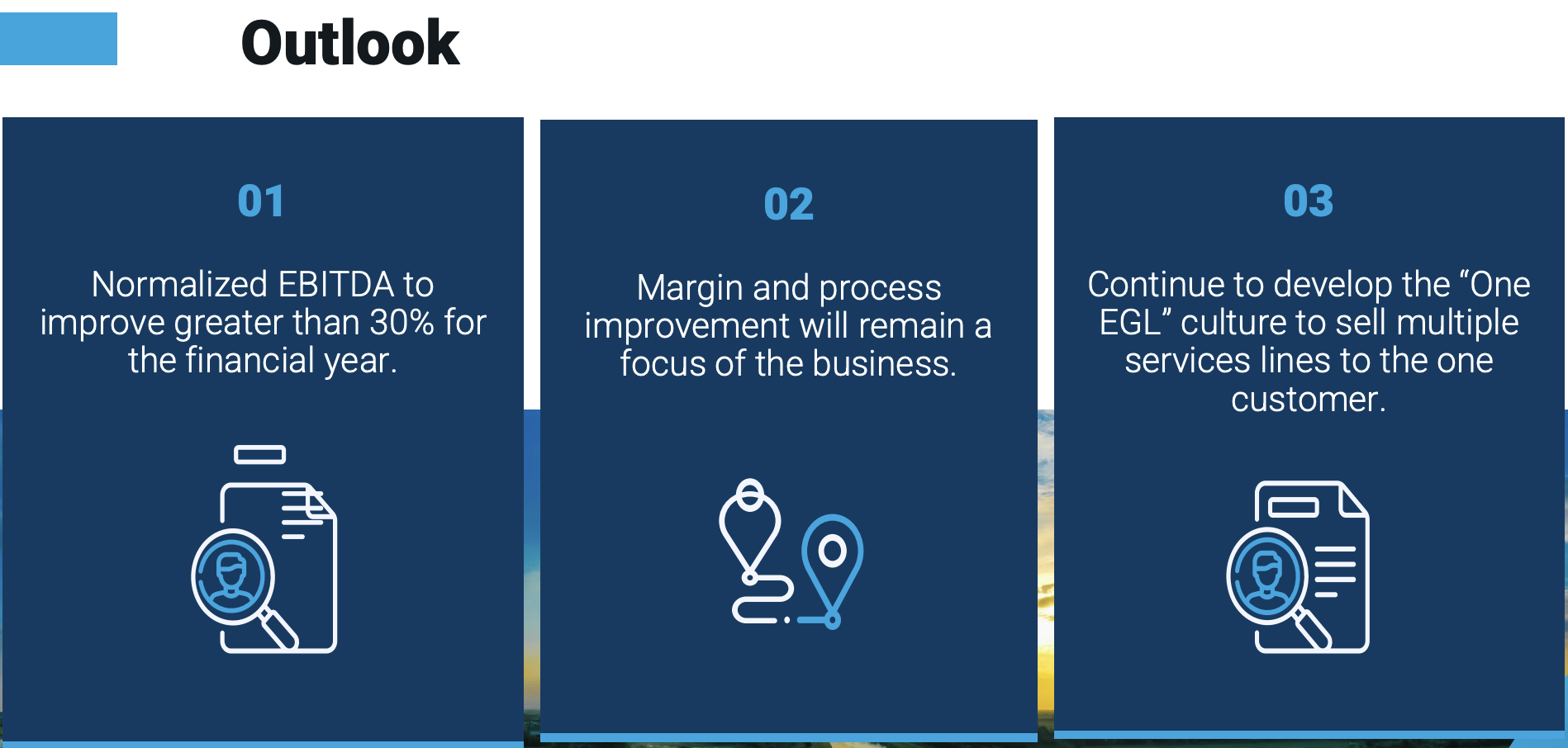
The team have built a reputation for being conservative on guidance and upgrading over the course of the year.
One of the aspects to the business we like a lot is that it’s very capital light. $500-$600k of CAPEX per annum is a reasonable guess based on prior year accounts. Knock off another $1m for lease expenses that get included in EBITDA in the new accounting standards (this applies to literally every company with an office, by the way).
Cash EBIT is our preferred metric for valuations. Based on current guidance, EGL will generate $7-$8m of cash EBIT in FY24.
With a market cap of $82m and EV of $74m, the business is trading on 9-10x EV/EBIT.
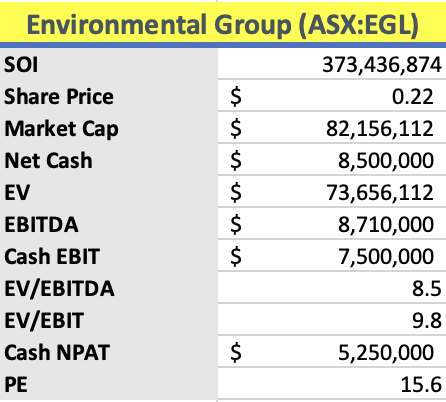
For a business growing at the pace of EGL, with the structural growth in their target industries and the track record of management, we think that’s a very attractive entry price. As the market cap approaches and surpasses $100m the larger funds will be able to invest, with the recent substantial investment by Greencape a great start.
In terms of catalysts, we’d keep an eye on the AGM coming up later this month.
4 topics
2 stocks mentioned
